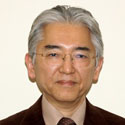Advisory Board and Editors Oncology

Kazunori Kataoka
Professor of Biomaterials at Department of Materials Engineering of University of Tokyo. Joint appointment in Medical School of University of Tokyo as Professor of Clinical Biotechnology, Center for Disease Biology and Integrative Medicine. Editorial of Journal of Biomaterials Science, Polymer Edition. Associate Editor of Biomacromolecules. Associate Editor of Biomaterials. Recipient of the 2012 Humboldt Research Award. President of Controlled Release Society. Reciepient of the 2015 Journal of Drug Targeting Life-Time Achievement Award.

Alex Kentsis
Assistant Professor of Pediatrics at the Memorial Sloan Kettering Cancer Center and Weill Cornell Medical College of Cornell University.
He leads research in the functional proteomics and genomic plasticity of refractory childhood cancers.

Imran Khan
Dr. Imran Khan is a Postdoctoral Research Associate at the University of Nebraska Medical Center.
His work focuses on translational research, particularly for human tumors (glioma, brain metastasis, colon cancer and PDAC) investigating the mechanisms of tumor aggressiveness, establishing new effective treatments, and finding new diagnostic and prognostic biomarkers in in-vitro, in-vivo, and ex-vivo model systems.

Takeshi Kurita
I am a Professor of Biology at the Institute of Science Tokyo. My research interest lies in the molecular and cellular basis of development and reproduction, two fundamental processes for all multicellular organisms. I am particularly interested in the cell and tissue communications that regulate these processes. In embryonic development, interactions between tissues of different cell lineages drive organ formation by activating genetic and epigenetic programs for tissue patterning and cellular differentiation. Tissue interaction also plays a fundamental role in mammalian reproduction as it mediates the actions of sex steroid hormones in reproductive organs. Deregulation of signaling pathways that control tissue communications could lead to conditions such as cancer. Thus, I also investigate the molecular pathogenesis of disorders in reproductive and hormone-target organs. Since mammalian development and reproductive functions are controlled by complex crosstalk among multiple tissues, organs, and systems, we primarily use in vivo mouse models for the investigation.
Understanding the molecular mechanisms underlying the fundamental process of life is a goal of our research. In addition, our research also aims to improve human health through translational research based on the knowledge obtained through basic research.

Hang Fai Kwok
Prof Kwok’s research interests mainly focus on the development of novel monoclonal antibodies and venom-based peptides as prototype drugs for anticancer and anti-inflammatory therapies. In addition, Prof. Kwok’s research group is also expanding scientific knowledge and research in the areas of existing and novel cancer biomarkers such as 1) matricellular protein — OPN, 2) metalloproteinase — ADAM17 & ADAMTS5, 3) DNA replication licensing factor — MCM proteins, 4) small GTP binding protein — RAN, as well as immunotherapy markers (e.g. PD-1/PD-L1) in order to identify and validate their prognostic and therapeutic values according to the roles in hallmarks of cancer.

Julia Kzhyshkowska
1997: PhD Cancer Research Centre of the Russian Academy of Medical Sciences, Moscow.
1997-2001: Postdoc at the University of Regensburg
2001-2007: Junior group leader/PI and lecturer, University of Heidelberg.
2007- 2010:Senior group leader/PI and senior lecturer, University of Heidelberg
2010-2013: Professor, head of the Lab for Cellular and Molecular Biology of Innate Immunity;
2013-permanent: Professor, head of Department for Innate Immunity and Tolerance, University of Heidelberg.

Brittany N Lasseigne
Brittany N. Lasseigne, PhD is an Assistant Professor of Cell, Developmental and Integrative Biology at The University of Alabama at Birmingham School of Medicine. She trained in Biotechnology, Science, and Engineering at Mississippi State University (B.S.) and the University of Alabama in Huntsville (Ph.D.) and completed a postdoctoral fellowship in genetics and genomics at the HudsonAlpha Institute for Biotechnology.
Her lab develops and applies genomic- and data-driven strategies (including single-cell and long-read sequencing) to discover biological signatures that might be used to improve patient care and provide insight into the cellular and molecular processes contributing to disease, especially for diseases impacting the brain and/or kidney. Their recent work includes prioritizing drug repurposing candidates for cancers and polycystic kidney disease, evaluating preclinical models and cross-species transcriptomic signatures to improve disease modeling, and applying single-cell and long-read technologies to neurological disease tissues to understand the role that context plays in disease etiology, progression, and treatment.
The Lasseigne Lab is currently focused on integrating genomics data, functional annotations, and patient information with machine learning and regulatory network approaches across diseases that impact the brain or kidney to discover novel mechanisms in disease etiology and progression, identify genome-driven therapeutic targets and opportunities for drug repositioning and repurposing, determine clinically-relevant biomarkers, and understand how cellular context contributes to these diseases. Collectively, these distinct projects all apply genetics and genomics to human diseases and build tools to accelerate future research. Their lab also develops data science software and analytical pipelines that are open-source, well-documented, and hosted by third-party code distributors, critical for facilitating reproducibility and enabling the research community to use the methods they develop.

Zhiming Li
Dr. Zhiming Li is an early career researcher at Columbia University. His primary research focus is on epigenetic inheritance and cancer epigenetics, and his long-term goals are to understand the fundamental mechanisms of epigenetic inheritance and how such mechanisms and epigenetic alterations are involved in tumorigenesis, which eventually would allow him to identify druggable targets for cancer intervention.

Ning Li
Prof. Li received his Medical Doctorate in 2005 as an outstanding graduate of the Chinese Union Medical University (CUMU). In the same year, he worked in the Department of Thoracic Surgery at the Cancer Hospital of the Chinese Academy of Medical Sciences, where he served as an attending physician, deputy chief physician, and was appointed Chief Physician in 2019. He has a solid theoretical foundation and excellent research ability, and has accumulated rich clinical experience during my work. In 2017, he took over as the Director of the Office of Drug Clinical Trial Research Center, and his outstanding achievements in the management of clinical trial institutions and clinical and translational research, and is currently served as the chief expert of China GCP platform and Leading PI of international multicenter clinical trials of anti-cancer drug discovery. He is committed to new anti-tumor drug research, real-world research, full chain translation research of clinical trials, precision treatment of rare tumors and tumor big data research. His H-Index is 44 based on Web of Science. As a sub-project leader of the National 973 Major Project, the National Key R&D Program for Precision Medicine, the National Natural Science Foundation of China, the GCP platform leader, and the leader of the 13th and 14th Five-Year Innovation Project, he has undertaken many research projects.

Jiaqi Liang
Dr. Jiaqi Liang is a Researcher in the Department of Thoracic Surgery, Zhongshan Hospital, Fudan University. Her research predominantly focuses on the clinical and molecular research of lung cancer.

Annika Lindblom
Professor in medical genetics, senior consultant at the department of Clinical Genetics Karolinska University Hospital.

Dongliang Liu
Dr. Dongliang Liu is a Postdoctoral Associate in the Department of Surgery at the Baylor College of Medicine. His research interests include: Cancer therapy, especially for pancreatic cancer immunotherapy; Chimeric virus-like particles (VLP) vaccine, especially for cancer vaccines; Novel antibiotics development including antimicrobial peptides; Epitomics and multi-epitope peptide vaccine development for pathogenic viruses.

